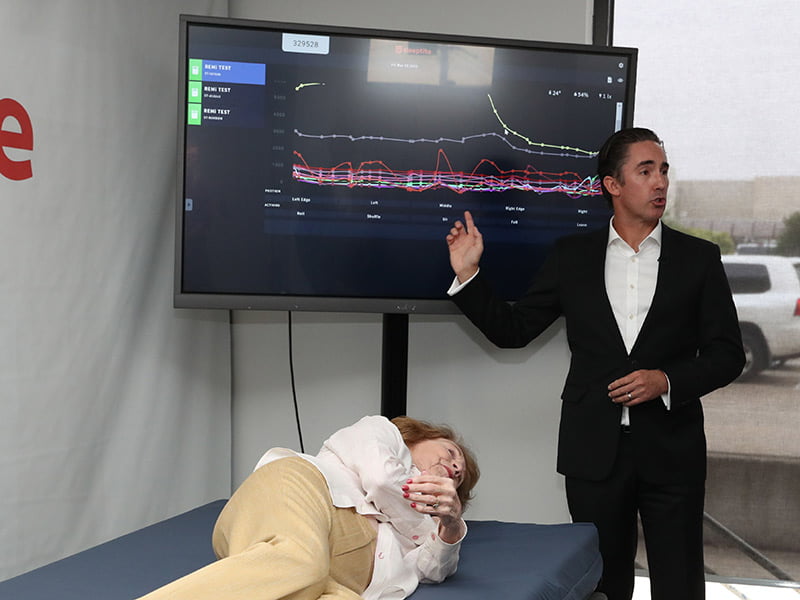For Cameron van den Dungen, sleep is a family business. The son of one of the founders of the Forty Winks franchise, he knows the mattress game literally inside and out.
Research suggests we spend about a third of our lives either sleeping or attempting to sleep. Sleep is an essential part of our overall physical and mental health and yet up to one in five Australians is estimated to be living with a diagnosable sleep disorder, not to mention the many millions more who may be spending their nights in sub-optimal conditions.

You would think, given the universal significance of quality sleep, that this would be an area of biomedical research that was absolutely flooded with data, but you’d be wrong. Say your GP suspects that you are suffering from sleep apnoea. She will most likely refer you to one of the major sleep clinics dotted around our capital cities. You’ll be admitted, strapped up to a number of machines to measure you throughout the night and asked to sleep, observed, in an unfamiliar bed.
The data collected from such a study is no doubt very useful for diagnosing major sleep disorder, but it is far from perfect and certainly isn’t useful in determining what good sleep is.
“There is actually no good science to prove what a good night’s sleep actually looks like right now from a data point of view,” Mr van den Dungen explains. The closest thing he could find was data from the wearables market, but therein lay problems too.
“Technology should fit the user. People sleep differently, wear different clothes, like different types of sheets, different weights of doonas, heights of pillows. They like different levels of noise and light levels. So, if I’m going to try and make them wear a pyjama top to get the data and they don’t like wearing pyjama tops, well, automatically my tech is out the window.”
This line of thinking lead Mr van den Dungen into the world of “nearables” instead.
“I then met this incredible researcher, Madhu Bhaskaran, from RMIT University,” he says. “The Australian Academy of Science actually introduced us. Madhu just showed me this system she’d had a breakthrough on which is essentially like an electronic skin. She’s gone on to win a lot of awards. I feel quite lucky that I was introduced to this rockstar early on in her career.”

Dr Bhaskaran’s team had developed a method for printing highly flexible and sensitive sensors onto material similar to a contact lens.
“I asked her: could we take this type of material and put it on the surface of a bed and instead of collecting environmental information like UV exposure or noxious gases, instead look internal to the body? And Madhu said: ‘I’m sure we can, yes.’”
Three years later, with the aid of a Cooperative Research Centres Projects (CRC-P) grant, the result is the Sleeptite REMi: a mattress protector that not only measures pressure, weight distribution, temperature and humidity but is sensitive enough to also reliably measure respiration and even heart rate. The company is a contender in the Medtech and Biotechnology category of the InnovationAus 2021 Awards for Excellence, as well as a People’s Choice Award finalist.
The launch market for the REMi is aged care, but Van den Dungen has a vision of the REMi as an eventual replacement for many of the expensive devices necessary for monitoring hospital patients even in the most emergent situations:
“I have future ambitions that, instead of having to hook you up to machines, the moment you lie on an emergency room or ICU bed it could detect and record all your vital signs as a nearable.”
He also sees applications for cot sheets that could replace unreliable breathing monitor plates currently used by concerned parents as an anti-SIDS precaution or in incubators used in Neonatal Intensive Care Units.
Importantly, the whole device has been designed with a serious focus on price point.
“The whole thing has been built within a price matrix that will make adoption less of a hurdle,” Mr van den Dungen says. “Because I had already been in and around the bedding sector, in particular, I knew exactly what the market would bare.
“I said to my team early on: we can’t afford to be more than a couple of hundred dollars above the current price matrix. The RMIT team took that on as a challenge to try and build this product within that price matrix and easy to scale.”
The REMi is waterproof, washable, and tested to withstand the bleaching, scrub down and sanitation procedures typical in nursing home facilities.
“You can literally pressure wash them if you want to,” he explains. “The sensors are embedded underneath a plastic coating that fully protects the device from cleaning.”
It’s also made right here in Australia. The tech is so bleeding edge they have had to innovate a now patented manufacturing process that will be able to be contracted by other wearable and nearable companies as well.
Thanks to a recent successful Advanced Manufacturing Growth Centre grant, Sleeptite is moving forward with establishing a full-scale manufacturing presence in Melbourne over the next 12-18 months.
The InnovationAus 2021 Awards for Excellence will be presented at a gala black-tie dinner held on Wednesday, December 1, at the Overseas Passenger Terminal in Sydney. You can book your tickets at the Awards website. For further enquiries, please email Awards@InnovationAus.com
Do you know more? Contact James Riley via Email.
